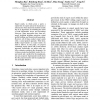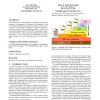202 search results - page 15 / 41 » Embedding Formal Knowledge Models in Active Documents |
ACL
2008
13 years 9 months ago
2008
Expert search, in which given a query a ranked list of experts instead of documents is returned, has been intensively studied recently due to its importance in facilitating the ne...
ERSHOV
2009
Springer
14 years 2 months ago
2009
Springer
Abstract. A basic cornerstone of the Semantic Web are formal languages for describing resources in a clear and unambiguous way. Logical underpinnings facilitate automated reasoning...
CEC
2007
IEEE
14 years 1 months ago
2007
IEEE
—Nature-inspired routing protocols are becoming an active area of research. Researchers in the community follow a wn engineering philosophy: inspire, abstract, design, develop an...
WWW
2006
ACM
14 years 8 months ago
2006
ACM
Addressed in this paper is the issue of semantic relationship extraction from semi-structured documents. Many research efforts have been made so far on the semantic information ex...
WWW
2003
ACM
14 years 8 months ago
2003
ACM
The Sematic Web is vitally dependant on a formal meaning for the constructs of its languages. For Semantic Web languages to work well together their formal meanings must employ a ...


